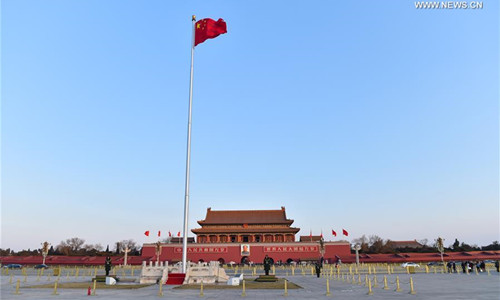
Photo taken on Dec. 22, 2016 shows the morning scenery of the Tiananmen Square in Beijing, capital of China. (Xinhua/Li He)
China has become one of the safest countries in the world, with an average of 6.2 murders for every 1 million people in 2016, the country's top political and legal affairs official has reported.
The rate of major violent crimes in China dropped 43 percent from 2012 to 2016, the rate of major traffic accidents was down 56 percent, while the public's satisfaction with social security rose from 87.5 percent in 2012 to above 91 percent in 2017, Meng Jianzhu, head of the Political and Legal Affairs Commission of the Communist Party of China (CPC) Central Committee, said at a meeting on public security and social management in Beijing on Wednesday.
In commenting on this, a People's Public Security University expert who requested anonymity told the Global Times on Thursday, "While the country maintains strong control over society, it still manages to grow its economy at a considerable rate. The combination of the two is what leads to a low crime rate."
China started overhauling its police force in 2015 to increase efficiency and improve its public image, with more than 100 reform measures, covering domestic security, administration, personnel and law enforcement.
In June, the People's Public Security University worked with Peking University and a National Bureau of Statistics poll center on a survey of the results of reform measures. It showed a satisfaction rate above 90 percent in vehicle inspections and household registration.
Another assessment that is still going on includes the protection of lawyers' rights.
These figures also show the social security improvements following the 18th National Congress of the Communist Party of China in 2012. The 19th National Party Congress will be held in October.
At the Tuesday meeting, Meng laid out the tasks ahead, pointing specifically to economic risks that are likely to become public security threats.
In the past month, police across the country have been detaining people involved in a pyramid scheme called Shanxinhui, who got other people involved in pyramid selling schemes, then cheated them out of large amounts of money under the guise of helping the poor.
In July, some Shanxinhui members gathered in Beijing to protest against the treatment of Zhang Tianming, the organization's legal representative, who was held on suspicion of organizing a pyramid scheme.
Intelligent detection
Meng also spoke about how crimes have become intertwined with the Internet, which was affirmed by the anonymous expert, who said that investigating Internet financial scams has been a recent focus of police work. He added, "Most of the online financial products that boast of a rate of return above 6 percent are fraudulent. These crimes touch a broad base of people and can easily trigger protests."
Meng went on to propose that public security departments explore new ways to use AI to study terrorist cases and other public security problems, to find out how they evolve, and to use that to build mathematical models based on the data.
"To prevent security risks in places with a large number of people, we need to use intelligent sensing technology to detect sources of dangers," Meng added, then called for a uniform database and the greater integration of surveillance resources at the township, county and city level.
Another expert from the People's Public Security University, who also requested anonymity, told the Global Times that more than 50 percent of the cases solved by Chinese police now depend on surveillance.
"The most commonly used technology is surveillance cameras, fingerprint databases, and facial recognition, but the use of artificial intelligence for investigations is still at a primitive stage, but big data is the inevitable approach," the expert concluded.
